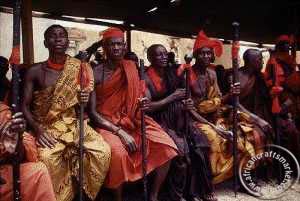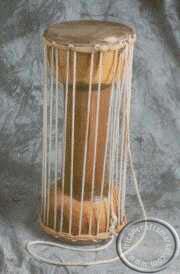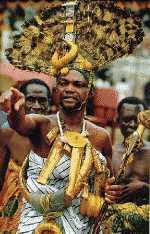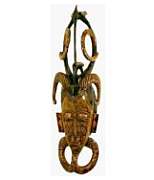Ashanti People Traditions & Culture
TRIBES PEOPLE GROUPS
Ashanti
The Ashanti live in central Ghana in the Rain forests of West Africa
approximately 150 miles away from the coast. The Ashanti are a
major ethnic group of the Akans (Ashanti and Fanti) in Ghana, Ghana
is a fairly new nation, barely more than 50 years old, and Ghana
was previously called the Gold Coast. Much of the modern nation of Ghana was
dominated from the late 17th through the late 19th century by a
state known as Asante. Asante was the largest and most powerful of
a series of states formed in the forest region of southern Ghana by
people known as the Akan. Among the factors leading the Akan to
form states, perhaps the most important was that they were rich in
gold. It is now politically separated into four main parts. Ashanti
is in the center and Kumasi is the capital. The Ashanti are the largest tribe in Ghana and
one of the few matrilineal societies in West Africa. The area of
Ashanti is 9400 square miles with a population of about one
million.
The Ashanti are the largest tribe in Ghana and
one of the few matrilineal societies in West Africa. The area of
Ashanti is 9400 square miles with a population of about one
million.
 The Ashanti people have always been known as fierce fighters.
The people of this tribe have a slogan: "If I go forward I die, If
I go backward I die, Better go forward and die." When the Ashanti
tribe was faced with war, they used drums to signal the upcoming
battle. The beat of these drums could be heard through the dense
forest. The Ashanti have a special handshake, in which you hold
your left hand out to shake hands. This comes from the Ashanti's
explanation that the left hand holds the shield, and the right hand
holds the spears. So, in order to show your trust in someone, you
put down your shield and therefore have your left hand free.
The Ashanti people have always been known as fierce fighters.
The people of this tribe have a slogan: "If I go forward I die, If
I go backward I die, Better go forward and die." When the Ashanti
tribe was faced with war, they used drums to signal the upcoming
battle. The beat of these drums could be heard through the dense
forest. The Ashanti have a special handshake, in which you hold
your left hand out to shake hands. This comes from the Ashanti's
explanation that the left hand holds the shield, and the right hand
holds the spears. So, in order to show your trust in someone, you
put down your shield and therefore have your left hand free.
To the Ashanti, the family and the mother's clan are most important. A child is said to inherit the father's soul or spirit and from the mother a child receives flesh and blood This relates them more closely to the mother's clan. The Ashanti live in an extended family. The family lives in various homes or huts that are set up around a courtyard. The head of the household is usually the oldest brother that lives there. The elders choose him. He is called either Father or House father and is obeyed by everyone.
The Ashanti religion is a mixture of spiritual and supernatural powers. They believe that plants, animals, and trees have souls. They also believe in fairies, witches, and forest monsters. There are a variety of religious beliefs involving ancestors, higher gods, or abosom, and 'Nyame', the Supreme Being of Ashanti. The Ashanti also practice many ceremonies for marriage, death, puberty, and birth.

 The golden stool is sacred to the
Ashanti; today great pride in the Ashanti King lives on in the
tradition of the Golden Stool. There is an elaborate legend
surrounding it that is told by the old men of Ashanti. The golden
stool is very carefully protected. No one has ever sat on it and
since its arrival; it has not touched the ground.
The golden stool is sacred to the
Ashanti; today great pride in the Ashanti King lives on in the
tradition of the Golden Stool. There is an elaborate legend
surrounding it that is told by the old men of Ashanti. The golden
stool is very carefully protected. No one has ever sat on it and
since its arrival; it has not touched the ground. 
 As an Ashanti symbol, the
golden stool represents the worship of ancestors, well-being, and
the nation of Ashanti. As a symbol of nationhood, and because if
contains the sumsum or Soul of Ashanti, the Golden Stool is
considered to be so sacred that no person whatsoever is allowed to
sit upon it. It is kept with the strictest security and precaution;
and is taken outside only on exceptionally grand occasions. Never
must it come in contact with the earth or the ground. It is always
lying on its own stool or on the skin of an animal such as the
leopard. Ashanti's have on many occasions made great sacrifices to
defend it when its safety had been threatened. In 1896 they
submitted to the deportation of their King, Prempeh I, rather than
resort to a war in which they feared they might suffer defeat and
risk the loss of the Golden stool. They deemed the loss of their
King a small thing compared with the loss of their Golden
Stool.
As an Ashanti symbol, the
golden stool represents the worship of ancestors, well-being, and
the nation of Ashanti. As a symbol of nationhood, and because if
contains the sumsum or Soul of Ashanti, the Golden Stool is
considered to be so sacred that no person whatsoever is allowed to
sit upon it. It is kept with the strictest security and precaution;
and is taken outside only on exceptionally grand occasions. Never
must it come in contact with the earth or the ground. It is always
lying on its own stool or on the skin of an animal such as the
leopard. Ashanti's have on many occasions made great sacrifices to
defend it when its safety had been threatened. In 1896 they
submitted to the deportation of their King, Prempeh I, rather than
resort to a war in which they feared they might suffer defeat and
risk the loss of the Golden stool. They deemed the loss of their
King a small thing compared with the loss of their Golden
Stool.
The village is a social as well as an economic unit. Everyone
participates in the major ceremonies, the most frequent of which
are funeral celebrations, which typically last several days.
Attendance at funerals is normally expected from everyone in the
village and expenditure on funerals is a substantial part of the
household budget.
The Ashanti are noted for their expertise in a variety of
specialized crafts. These include weaving, wood carving, ceramics, the reknown
kente cloth and metallurgy. Of these crafts, only pottery making is
primarily a female activity; the others are restricted to male
specialists. Even in the case of pottery making, only men are
allowed to fashion pots or pipes.
 Bark cloth was used for
clothing before weaving was introduced. With weaving, there is
cotton and silk. Women may pick cotton or spin materials into
thread, but only men are allowed to weave. There are different
patterns in weaving, each with its own name. Sometimes the pattern
represents social status, a clan, a saying, or the sex of the one
wearing it. Patterns are not always woven in the cloth. It can also
be stamped on in many designs.
Bark cloth was used for
clothing before weaving was introduced. With weaving, there is
cotton and silk. Women may pick cotton or spin materials into
thread, but only men are allowed to weave. There are different
patterns in weaving, each with its own name. Sometimes the pattern
represents social status, a clan, a saying, or the sex of the one
wearing it. Patterns are not always woven in the cloth. It can also
be stamped on in many designs.
Kente cloth is only worn in the southern half of the country and
- as distinct from other forms of traditional weaving - is reserved
mainly for joyous occasions. Traditionally the Kente cloth is a
festival cloth worn mainly during the annual and seasonal
festivals, which are happy occasions. Today they are not only used
for festive occasions but also during the rituals associated with
the important events of life; for example, marriage, death, and
religious worship. Therefore, it is quite appropriate for outsiders
to wear it for religious and festive occasions.
Wood carving is divided into many branches, each with its own specialists. Among the major products are wooden sculptures of outstanding artistic quality and the talking-drums. The Ashanti fertility doll or "Akua ba" doll is commonly found in the homes of the Ashanti and given to the females in the village to bring them closer to the spirit of Fertility Gods.
The Ashanti play an African game called "Kikogo" which means transferring and refers to players moving markers that are usually beads or stones around a wooden board that has cups or depressions similar to that of an egg carton. The game is as popular as draughts (checkers) are in the western countries
Click here Learn about more African tribes and traditions
The Ashanti tribe ~ The Bushman tribe ~The Maasai (Masai) tribe ~The Ndebele tribe ~The Shona tribe ~ The Teke people / Kidumu tribe ~The Zulu tribe
AFRICAN CRAFTS MARKET is a company situated in South Africa that has many Zulu pieces of art available for sale, from the lovely Zulu bead work and grass weave baskets through the traditional Zulu shields. To view the items that may be of interests to you go to our gallery pages on our website at www.africancraftsmarket.com











